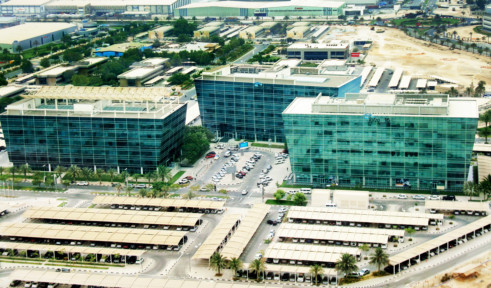
Dubai: While the global economy is sending out mixed signals, it’s clear that the economic cues from Dubai show the emirate is in robust shape. Dubai’s strengths — trade, tourism and logistics — mean that its diversified economy is likely to emerge more intact as a result of declining oil prices than its GCC peers.
Though general sentiment has been upbeat, there appears to be a certain amount of restraint in some quarters.
Thanks to its free zones, tax free structures and favourable banking regulations, Dubai will remain as a major global transshipment and re-export hub. The economy is expected to grow at 5 per cent annually, and the industrial and logistics market can only benefit from the increase in capacity and an influx of new businesses in the region.
The Dubai International Airport recently emerged as the world’s busiest airport by passenger traffic in 2014 and this, combined with the ambitious expansion plans being developed for Dubai World Central (DWC), will increase the attractiveness of industrial areas close to the airport.
Dubai International Airport is positioning itself as the premier global integrated logistics hub which would act in parallel to the bonded transport and logistics corridor from Jebel Ali Free Zone Authority (Jafza) to DWC. The latter would provide a multi-modal logistics platform, linking sea, land and air from Jebel Ali Port to DWC and enable seamless and speedy transaction turnaround for goods and freight.
Arun George Senior Surveyor at Knight Frank Dubai; which is part of the Knight Frank Global Network, the world’s largest privately-owned global property agency and consultancy, predicts
Regional hubs
The maximum space absorption/demand will be from the retail, FMCG, automobile and logistics sectors. The automobile sector could continue to see growth, with global majors setting up regional hubs within Dubai’s free zones.
There is an expectation that luxury car manufacturers will use these hubs in order to reduce the spare parts/service turnaround time for their customers. We also expect that free zones will be used as feeder locations for the GCC, Africa and Asia.
Jafza, with its existing industrial ecosystem and its ability to offer customised solutions to strategic occupiers, could well emerge as a favoured destination.
Drivers for industrial space demand in the future will include multinational companies relocating to Dubai or creating regional supply chain headquarters in the city or existing global occupiers consolidating their base from widespread locations.
There could be relocations from companies and businesses in Al Quoz seeking more price-competitive locations, larger units and better connectivity, and small and medium-sized freight forwarding, logistics, third party logistics/warehousing businesses who continue to flock to DWC.
Those developments, which offer longer leasehold tenures, better road networks as well as zoning and social and retail amenities, are emerging as the destinations of preference.
Implicit insecurity
Because there is no freehold ownership of industrial land or units by foreign companies which are 100 per cent non-GCC owned, a viable and attractive alternative is for these organisations to procure land on freehold titles of between 30 to 45 years and building a custom facility.
Another option is to lease a pre-built unit from a master-developer or from the secondary market. Occupiers are discouraged from taking properties with short leasehold terms or to sublease pre-builts with shorter master land leases because of their implicit insecurity.
We’ve also seen a sizeable increase in yearly renewable ground rents and sublease fees which could see occupiers relocating to newer locations such as Dubai Investment Park (DIP) or Dubai Industrial City (DIC) both of which offer excellent connectivity and access. These locations have witnessed a large improvement in the road infrastructure recently, with flyovers and road-widening occurring as a direct result of Expo 2020.
Easy access to 311 and 611 make these areas attractive and competitively-priced for those seeking industrial locations.
In addition, proposals for the extension of the Red Line of the Dubai Metro which will run from Jebel Ali to the Expo 2020 site are another attractive driver for both locations.
These ongoing and proposed improvements to connectivity, access and social infrastructure will, without doubt, contribute to the establishment of these two areas as stand out locations over the long term.
The writer is Senior Commercial Surveyor at Knight Frank.











